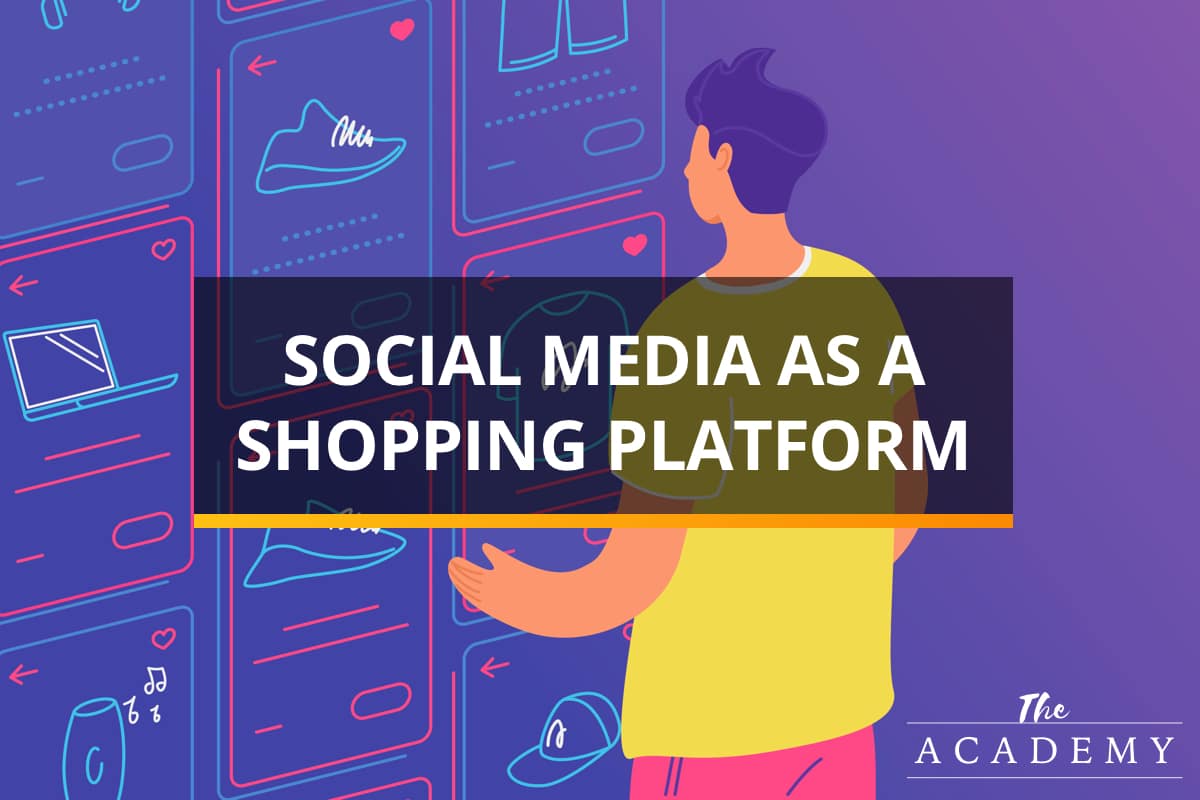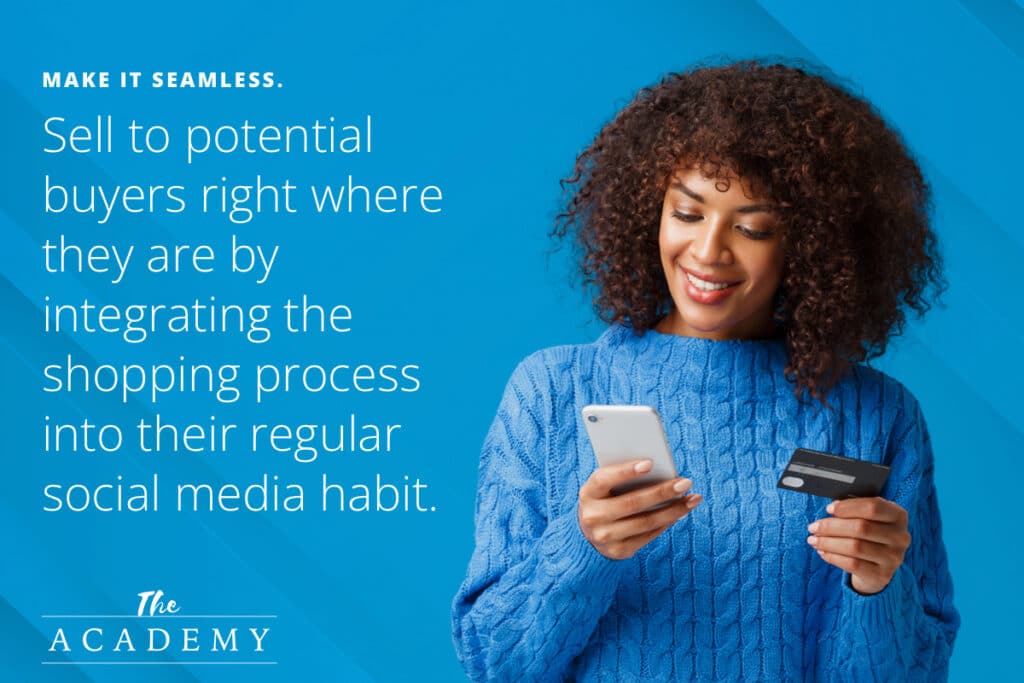
The popularity of social media needs no introduction. Billions of people around the globe have social media accounts, and countless hours are spent each day adding new posts, scrolling through feeds and more.
At the same time, the popularity of e-commerce is also no secret. Where people were once hesitant to make purchases online, those days are long since over. Today, most people make at least some of their purchases on the internet, meaning businesses need to vie for digital attention if they want to remain competitive.
It’s only natural that the popularity of these two spheres should meet, and that’s where social commerce comes into the picture. As the name suggests, social commerce is a blend of social media and e-commerce, and it offers the user a shopping experience directly inside of their favorite social media platforms. Keep reading for an introduction to the concept of social commerce, explain a bit about how it works, and talk about why you should be interested in using this opportunity to drive your small business forward.
A Fundamental Difference
It would be easy enough to lump social commerce in with traditional e-commerce, but they are fundamentally different concepts…
With traditional e-commerce:
- You are bringing visitors to your website with the aim of making a sale.
- You will use a variety of traffic acquisition methods to attract those visitors, such as PPC ads, search engine optimization, and yes, social media marketing.
- The transactions with traditional e-commerce happen on a property you own, typically a website that you pay to host on a server.
- You’ll build an e-commerce site, likely using WordPress and an e-commerce plugin, and your products will be added to that site for purchase.
- Everything about the actual buying and selling of an e-commerce transaction happens on a digital property that you own.
When you make the switch to social commerce—or engage in social commerce in addition to regular e-commerce:
- You are wrapping up the entire experience in a social platform like Facebook or Instagram. Rather than potentially using a social account to drive traffic to your site where you’ll hope to make a sale, the traffic never leaves the social space.
- Your products are available directly on the social platform, and there is no additional step. A social media user finds your products, likes what they see, and makes a purchase. That’s it.
- You might not even have a website for your business, and even if you do, it won’t play a role in the social shopping process.
At this point, it’s important to simply understand the difference between these two modes of selling online. Below, you can take a closer look at some pros and cons of the social commerce model and decide if it is right for your business.
The Many Benefits of Social Commerce

If you are going to invest the effort required to get started with a social commerce endeavor, you want to understand what it has to offer for your brand. So let’s take a closer look at what there is to like about social selling and why it could unlock new levels of growth for your business:
- It’s seamless. Every digital marketer knows the frustration of trying to make sales online. You will go to great lengths to gather up as many leads as you can, only to inevitably see some of those leads trickle out of your funnel at each stage along the way. By the time you get down to the point of visitors making purchases, you are only left with a fraction of the market you had initially attracted—and it might be a rather small percentage, at that. By going with social commerce, you take some of the steps out of the process and will hopefully be able to convert at a higher rate. The potential buyer is already on a social platform, so don’t ask them to leave. Instead, sell to them right where they are by integrating the shopping process into their regular social media habit. This should lead to a higher overall conversion rate and an improvement in your bottom line.
- A goldmine of information. Traditionally, getting feedback from your customers (or even just potential customers) has been difficult and expensive. That’s no longer the case when you utilize social selling. In this format, you can quickly and easily hear directly from people who might be interested in buying your goods. They can leave comments or interact with things like polls on which model they like better. Getting the audience involved will improve brand engagement and also help you collect data that can lead to better product decisions moving forward.
- Targeting made easy. Part of the challenge of selling online is simply getting the market’s attention. An even bigger part of the challenge is attracting the right market segment to turn brand awareness and leads into actual sales. This is called targeting, and it is much easier with social commerce than it is in other places. You’ll be able to tap into the incredible amount of information that social media platforms have available to pinpoint exactly who it is that you want to reach with your message and your goods. You’ll still have to offer great products and notable value to rise above the competition, but you should find it simple to get in front of the right potential buyers.
- Spread the word. By the very nature of social media, you’ll have the opportunity to benefit from the social, connected nature of these platforms. When someone makes a purchase from you on social, they can easily share that news with those in their circle, making it possible that one sale will yield one or two more down the line. People tend to associate with others who share their same interests and passions, so this way of connecting buyers can have a powerful effect on your sales volume. Also, if you are getting sales through the organic spread of your brand name across a social platform, you’ll be saving on marketing expenses by getting those new sales virtually for free.
- Get started quickly. There is very little required of you to get up and running with a social shop. Of course, you’ll need products to sell, but the digital overhead here is less than it would be when building out a traditional e-commerce site. If you have some products ready to go and want to get them out in front of an audience as soon as possible, it’s hard to beat social commerce for that objective.
Take Note of Potential Drawbacks
As much as there is to like about social commerce, nothing is without its downsides. Quickly, let’s look at some points that you should keep in mind when thinking about jumping into this arena.
- You don’t own it. When building a business, you typically want to take ownership over as many things as possible to gain control and make choices that are in your best interest. Since you won’t own a social shop in the same way that you would own an e-commerce site, you’ll always be somewhat at the mercy of that social media platform. For example, what if the platform decides to do away with their shopping system entirely, or they change the rules and it no longer works for you? Everything you have put into building a business in that space will be lost.
- Tons of competition. The ease with which you can get started selling on a social platform is both a good and a bad thing. The bad part of the equation comes in the form of ample competition who had just as easy of a time getting started as you did. When something is quick and easy to jump into, you can be sure that plenty of other people will have the same idea.
- Lose traffic. By letting buyers complete the entire process on the social platform, you lose the opportunity to get them onto your site and have them join a mailing list, make other purchases, etc. Again, it’s about giving up control. Yes, getting people to your site is an additional step that is removed when you sell on social media, but it’s important to acknowledge that there is a trade-off for taking that step out of the picture.
Selling on Facebook
While it’s possible to engage in social commerce on many different platforms, we’ll focus our attention in this section specifically on Facebook. It’s likely that you have built an audience on Facebook already, and if not, this is the big player in the social space that will likely grab your time and attention at first. As you won’t be surprised to learn, Facebook has built out a powerful selling platform called Facebook Shops, and you can use their hard work to your advantage to get up and running in short order.

What makes Facebook Shops so attractive is not only the massive audience already in place on Facebook, but also the many customization options that you’ll have to build your shop exactly as you would like it to be. So, you don’t have to worry about having a shop that looks just like every other shop on the platform; you can take the time to pick out the right colors, images, and more to create something that is perfect for your needs.
Also, you can choose how you would like to handle your shoppers through the Facebook Shops feature. As we have been discussing in this article, you can leave it as a true social commerce option, with the entire checkout process happening on Facebook. Alternatively, you could go for something that looks more like standard e-commerce by directing shoppers from your shop on Facebook over to your website where they can continue shopping and make a purchase.
Is social commerce right for your brand? That is yet to be determined, but it’s worth your time and effort to at least consider the possibility. With such a huge audience waiting to be accessed on social platforms, and with the selling infrastructure already in place to reduce the friction of getting your products to market, there is a lot to like about this idea.
Most Popular Articles

Seeing Favicons in Your Google Search Results? Here’s Why…
Have you noticed anything different in your Google Search results lately? Google added tiny favicon icons to its organic search results in January. It was…

Business Growth and Digital Marketing News & Tips 4-14-24
Did you know? It’s five to twenty-five times more expensive to acquire a new customer than to retain an existing one. Increasing customer retention by…

Business Growth and Digital Marketing News & Tips 3-28-24
With the desire for precise measurement tools to determine ROI, there has been a rise in attention metrics. These metrics, which often utilize eye-tracking data,…








